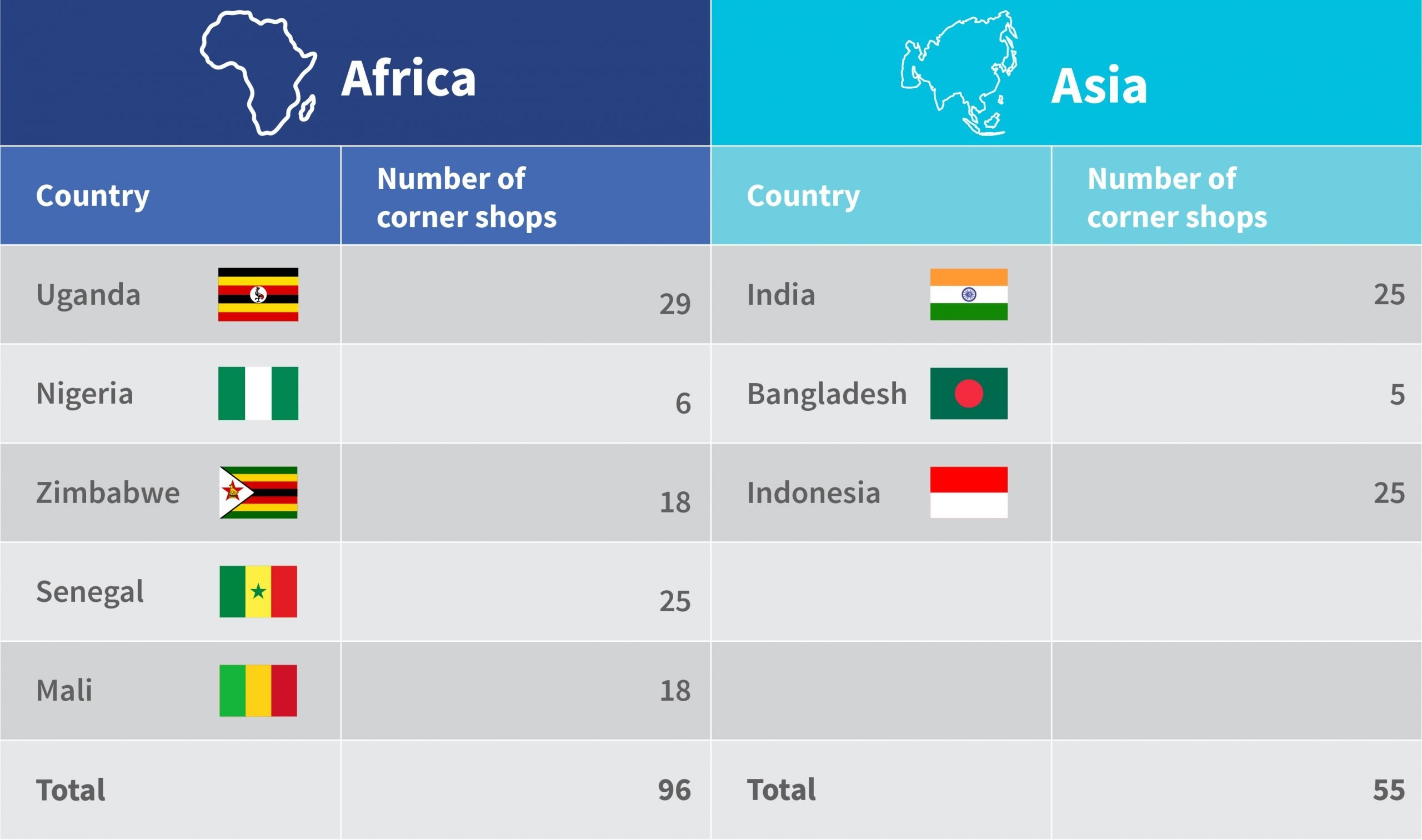The Corner Shop Diaries project: How small businesses in developing countries coped with the pandemic, helped the neighborhood to survive the lockdown, and embarked on the challenging journey to recovery
by Graham Wright, Rahul Chatterjee, Raunak Kapoor and Anne Marie van Swinderen
Feb 17, 2021
5 min
This blog offers a glimpse into the Corner Shop Diaries research in eight countries across Asia and Africa.
The past ten months have been a rollercoaster for Ali, owner of a corner shop from Wonosobo Regency in the Central Java province of Indonesia. As the pandemic swept through his community, Ali did not know if his business would survive. He was unsure if he could open his corner shop, where he would be able to secure supplies from, and even whether he dare accept payments in banknotes—alleged to spread the deadly virus.
In time, the cost of supplies rose and the wholesaler refused to deliver them to his shop. Ali persevered, driven by the need to protect his business and ensure that his community could get the basics for survival. He used social media to tell people what he had in stock and thought about accepting digital payment, but chose not to as there was little demand for it among his regular customers.
As the pandemic recedes and the promises of vaccines offer light at the end of what has been a torturously long and dark tunnel, Ali is rebuilding and diversifying his business. “At times I thought I did not have enough liquidity to survive but I have emerged stronger. I have even learnt how to market using WhatsApp and Facebook”, he reveals with a hint of pride.
Restricted mobility, a constant fear of exposure to the virus, loss of loved ones, and loss of income have characterized the year 2020 (and it continues in 2021 with reduced scale). The scale of the COVID-19 pandemic has been unprecedented, at least in the past 100 years. Till mid-January 2021, the novel coronavirus has claimed close to 2 million lives across the globe and crippled the economy of numerous countries, mostly owing to measures like lockdowns that the governments were forced to take to control the health emergency.
As the pandemic started to unfold, MSC identified how we could help inform the response to this unprecedented global emergency and reduce its damaging effects. After rounds of internal discussions and brainstorming, we started a two-pronged approach.
- Information to protect frontline workers and their clients: We developed communication material to inform MFI staff, CICO agents, and community members (MFI clients, SHG members) about the pandemic and safety measures they can adopt. These are now being used by organizations and have reached more than 26 million clients.
- Research to inform policy: We also launched a series of research initiatives to generate insights on the impact of the pandemic among various segments of the society (low- and moderate-income people, micro, small and medium enterprises, women, farmers, fintechs, etc.). Besides, we provided clear, actionable recommendations for policy interventions to respond to the pandemic and mitigate its damaging effects.
To fight an enemy as dangerous as the COVID-19 pandemic, we needed allies. And we found a natural ally with L-IFT. Like MSC, L-IFT sought opportunities to help the global community respond. They started by extending their Corner Shop Diaries project in Africa. The project tracked corner shops, small retail businesses, in neighborhoods where these shops were the sole source of essentials during the lockdown, using the Financial Diaries methodology. Recognizing the potential of this approach, MSC partnered with L-IFT to bring the project to Asia.
Since April, 2020, 78 corner shops in Senegal, Zimbabwe, Nigeria, and Uganda have reported to L-IFT on their financial transactions, how they are doing, and whether they can provide the basics to their customers. In July, 2020, five corner shops from Stuart Rutherford’s pioneering Hrishipara Financial Diaries joined the project. And from October, 2020, MSC started to track the progress of 25 corner shops each from India and Indonesia. L-IFT started tracking 18 corner shops in Mali from third week of January, 2021.
What was the rationale behind starting this research project? We are worried that all the poorest countries would be hurt disproportionately—not only by the disease but also by the lockdowns. Jean Drèze’s work on famines shows that most famines are the result of failing markets, faltering supply chains, and price shocks. We were concerned that these might happen as a result of the pandemic. We, therefore, wanted to track corner shops in different countries to monitor if food and other basics were still available, whether people could still afford them, and whether shops were surviving and could play their role of serving their communities and neighborhoods.
Initially, the research was seen as a way to identify, provide data, and raise the alarm for any specific locations where the situation was critical. Once the lockdowns were eased, the pandemic started to dissipate, and the economies started to revive, this research became a way to chronicle the journeys of the corner shops towards recovery, and to identify factors critical to their success.
The Corner Shop Diaries research sheds light on a variety of aspects (see Box 1) related to the effects of the pandemic and subsequent lockdowns on micro businesses and the people they serve. Even more importantly, if we can continue this data collection, we can learn about:
- How soon corner shops and their clients can reach pre-COVID economic levels;
- The challenges they face while doing so;
- What financial resources they can access;
- The barriers they face on their path to recovery;
- The impact of national and regional policies on their businesses; and
- Opportunities for governments and other agencies to support them.
Furthermore, we can examine in detail:
- How these corner shops market their goods and accept payment;
- The role (if any) that digitization might play, as well as the barriers and enabling factors for digital adoption; and
- How their path to digital acceptance might be accelerated.
We have documented our lessons from this research project in different countries through a series of blogs that we will publish on the project website as well as on the MSC website. Stay tuned for a more nuanced understanding of the struggle of small businesses during the pandemic and policy recommendations that can (and could have) help them to cope and recover.
For more details about the Corner Shop Diaries project, please write to Rahul Chatterjee <rahul.chatterjee@microsave.net>.
Written by

Graham Wright
Group Managing Director
 by
by  Feb 17, 2021
Feb 17, 2021 5 min
5 min 



Leave comments